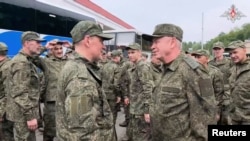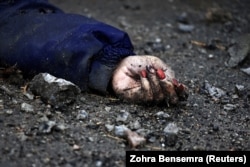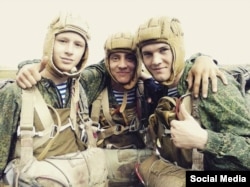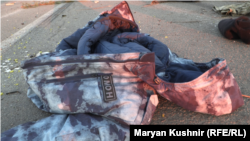Hundreds of Russian soldiers wounded in the Ukraine war have been treated in Belarusian hospitals, including some from military units linked to alleged war crimes in Ukraine.
The revelations come from a new report by the Belarusian Investigative Center done in conjunction with RFE/RL's Russian Service and Schemes, the investigative unit of RFE/RL's Ukrainian Service.
The disclosures are the latest stemming from a massive Russian Defense Ministry database of medical records that was leaked to RFE/RL earlier this year.
Those records include hundreds of thousands of military personnel, officers as well as rank-and-file soldiers, most of whom served in Ukraine. They provide an unprecedented window into the scope of Russia's casualties over the 40-plus months since it launched its full-scale invasion of Ukraine -- the largest and bloodiest land war in Europe since World War II.
Belarus's military and security agencies have been closely integrated into Russia's security structures for years, a process that accelerated after the February 2022 invasion. Belarus's longtime leader, Aleksandr Lukashenko, has resisted suggestions from the Kremlin to send its own armed forces into Ukraine, but he's allowed Russian forces to use some parts of Belarusian territory for operations.
Kateryna Rashevska, a lawyer at the Ukraine-based Regional Center for Human Rights, said treating Russian soldiers wounded in the Ukraine could be considered direct support for the war -- therefore removing any Belarusian claim to neutrality in the conflict.
"The treatment of Russian military personnel should be qualified as part of the general support for the war and the loss of neutral status," she said in an interview with the Belarusian Investigative Center, a consortium of exiled Belarusian journalists.
According to the leaked database, which roughly covers the first 2 ½ years of the war, at least 898 Russian soldiers passed through Belarus's medical facilities, a figure that includes regular armed forces as well as National Guardsmen.
More than half of the Russian troops who were treated in Belarusian facilities, according to the Defense Ministry database, are from the 64th Separate Motorized Rifle Brigade from the Far Eastern region of Khabarovsk. The database records 482 personnel from the brigade, including 20 officers.
Along with another unit, the 76th Guards Airborne Assault Division, the 64th brigade occupied several regions north of Kyiv, including the town of Bucha, where hundreds of civilians were tortured or killed in early 2022, according to Ukrainian officials.
One of the soldiers from the 76th division who served in Bucha was Aleksandr Kvitko, who commanded the division's 6th company. According to Schemes, Kvitko spent time at a house at 144 Yablonskaya Street, in Bucha, a house where Ukrainian investigators say members of the local Ukrainian territorial defense were held and later executed.
His name also appeared in a letter that was addressed to him and left behind at a house in Bucha, according to a Reuters report.
According to the database, Kvitko was admitted to the Homel City Hospital on March 28, 2022, treated for shrapnel wounds to the neck, arm, and leg.
Ukrainian investigators alleged Kvitko may have been involved in the murder of an elderly woman.
Kvitko did not answer calls and messages from RFE/RL seeking comment.
Battle For Hostomel
Other soldiers who ended up in Belarusian facilities were from units including the 16th Brigade of Russia's military intelligence agency, known as the GRU, which was involved in seizing the territory of the Chernobyl nuclear plant, as well as Ukraine's Kubinka-2 special forces center, whose soldiers were involved in the seizure of Ukraine's Crimea peninsula in 2014.
One of the soldiers whose name appears in the Defense Ministry database is Roman Zyazin, a 21-year-old corporal from the 31st Separate Guards Airborne Assault Brigade who was hospitalized in the Homel City Hospital on March 4, 2022, less than two weeks after the start of the invasion. Records indicate he was treated for an open fracture of his lower jaw.
Zyazin did not return to the war after being wounded, becoming a cadet at a military physical education institute.
In December 2024, he gave an interview to Zvezda, the official Defense Ministry TV channel, where he mentioned the Russian airborne assault on the Hostomel air field, north of Kyiv.
That assault, which occurred in the initial hours of the invasion, was thwarted by Ukrainian forces. Experts said Russian troops might have succeeded in capturing Kyiv if the airfield had been captured.
"We moved directly to the suburbs and the city of Hostomel itself, where I was wounded and was evacuated," Zyazin told Zvezda.
Russia forces who invaded Ukraine from the north in February 2022 also included nonmilitary troops: riot police from the OMON service. At least 68 OMON officers were also wounded and sent to Belarusian medical facilities for treatment, according to the database.
One of those officers was Aleksei Artamonov, who received three shrapnel wounds and a fracture and was taken to the hospital in Khoiniki. Ukrainian troops also discovered his Russian firearms permit and his driver's license, which were left behind after Russian troops withdrew.
Artamonov did not respond to messages form RFE/RL sent via social media.
Another OMON officer who was treated in a Belarusian facility was Andrei Khitrov, whom Ukrainian researchers have implicated in the mistreatment of civilians during the brief time when Russian troops occupied part of Hostomel.
The Belarusian Investigative Center identified approximately 70 soldiers from the 5th Separate Guards Tank Brigade and 37th Motorized Rifle Brigade, who were also treated in Belarusian facilities.
One, Zorik Zygbin, a tank commander, was hospitalized in Homel City Hospital on March 9, 2022, with shrapnel wounds. Zygbin returned to the battlefield after being released, then had one of his legs amputated in February 2023.
He is now studying to be a primary school teacher in Buryatia, while also participating in arm wrestling competitions.

















